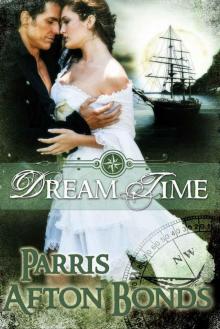- Home
- Parris Afton Bonds
Sweet Enchantress Page 2
Sweet Enchantress Read online
Page 2
She turned her back but was tensely aware of the beggar with every nerve of her body. She could almost feel the heat of his gaze. A violent man, she was sure.
Before daylight, the beggar rose from his place on the bench against the wall, where he had slept. His cloak had served as a covering.
The cock had not yet crowed, and snores still punctuated the great hall. The chill of predawn permeated the vast room. Remnants of last night’s roaring fire flickered dimly in the fireplace at the other end of the darkened room. The fire would not be allowed to die; soon servants would be scurrying to tend it.
He stretched, wondering where he might find the chapel, as it was his custom to go first to Mass. A sleepy-eyed Hugh, barely stirring, pointed the way to the Bishop’s Tower.
He passed through the guard room with its cavernous fireplace, feeling at ease in this setting but somewhat dismayed by its lack of soldiers. Only a few painted shields and a rack of blunted lances and maces girded the walls. Not enough to offer any sustained defense.
A tightly spiraling staircase led to the chapel. Candlelight from the chapel fluttered like a moth in the sculpture gallery outside. Reverently, he entered. Incense, sweet and heavy, pervaded the small, circular oratory. Where he had hoped to find a chancellor, he encountered the Countess de Bar.
Her back was to him. She sat cross-legged on a pillow in the center of the floor. Her unbound hair cascaded about her hips to sweep the colored tiles. From beneath the hem of her tunic, one bare foot peeked. With odd fascination, he stared at the soft exposed flesh, paler than her face or hands.
The incense . . . he felt heady. His gaze pulled free of her, seeking an altar or a wooden cross and found none. Instead of austere walls, the stones were plastered with a frieze of green scintillated with gold. The ceilings were adorned with metal stars—and a wheel of fortune, par Dieu!
Then he heard her voice: Soft, repetitive, unintelligible words. The hair at his nape bristled. She was unaware of his presence, and he quickly backed away. He was a soldier serving God and, thus, feared nothing. But whom did the chatelaine serve?
Troubled, he returned to the great hall, where a spartan meal was being served. With a murmured blessing, he quickly consumed a hunk of bread and a pot of cider. By now, the last members of the household had roused themselves to their duties. He, however, lingered behind to mix with the newcomers arriving to enter the Justice Room. From the shadows of a window embrasure, he watched with interest as the Knight Templar moved among the countess's vassals, questioning and sometimes lending advice.
The beggar had just about decided that it was, after all, Baldwyn Rainbaut who actually tended to administrative matters, when the Countess de Bar entered. She had dressed in a tight-fitting bodice over which was a lavender surcoat that was girded at her waist with a tortoiseshell brooch. Her hair had been brushed and bound once more in a net at her nape. Next to the Templar, she appeared fragile, no taller than a child. On her gloved fist rode the soft-breasted falcon, hooded.
She seated herself in the justice chair: a heavy chair covered with vermillion morocco and studded with nails. Its canopy was emblazoned with her cloth of estate, the same unicorn in full gallop.
The Templar passed her a sheet of parchment. Her eyes barely consulted the script as she enunciated in that cool, crystal voice the amount of acres that were to be ploughed that spring by boon custom and how many by demesne ploughs; discussed what stock was to be kept and improved at each manor; and, finally, granted a communal charter to one of Montlimoux's villages.
Once that business was transacted, supplicants came forward. The beggar listened as she dealt with a cottar's respectful complaint about a neighbor's theft of his pig; a weavers’ guild that desired to settle there if exempted from bridge tolls; a widow who wished to claim her one-third share of her late husband's estate.
He was expecting the Countess de Bar to suggest a suitable match for the rather homely but now wealthy widow, if only for the wedding imposts due Montlimoux. The wealth of an estate was determined by its profits from tithes and taxes.
The chatelaine startled him. She leaned forward and said, "Madam le Blanc, I would advise you to hie yourself to a convent where you will be free from male domination. With your experience, there is no reason why you could not become an abbess and wield broad authority.”
Next a weeping maid was pushed forward by a buxom peasant woman in russet home- spun, who wore a straw hat over her wimple. Tight-lipped, arms folded, she charged, "My daughter-in-law has aborted her baby.”
The tenants and villagers began murmuring among themselves. Thoughtfully, the countess brushed the quill's feathered tip back and forth across her lips. At last, she said, "And the justice you seek?”
"Death. Nothing less than the death she brought upon my son’s unborn child.”
The chatelaine laid down her quill and addressed the young woman. "You wish to speak?”
The maid stared down at her mud-caked clogs. "I—my husband, he—forced me.” She swallowed hard and said in a lowered voice, "He raped me.”
“He is your husband,” the mother-in-law broke in.
“’Tis her body,” the chatelaine said. Wide-eyed, the peasant woman forgot herself momentarily. "The bishop will hear of – ”
“’Tis her body, not the Church's,” the chatelaine said firmly. "Where is your husband?” she asked the younger woman.
"In the fields.”
One of the countess’s straight brows raised. Her lips compressed. "As he did not have the courage to come himself, I charge you, madam, and your son to treat your daughter-in- law here as your equal. Should I be apprised otherwise, you will suffer the consequences. Do you understand, madam?”
The straw hat of the peasant woman bobbed in acknowledgment. Beneath it, the older woman's face was choleric.
The rest of the petitioners in the great hall appeared to accept the verdict. The beggar was astonished by this blatant blasphemy. Surely this was a solemn comedy being enacted!
His disgust and agitation must have betrayed him. The chatelaine lifted her chin, as if scenting something unpleasant. Slowly, her head pivoted. Her gaze searched the recesses of the room to settle on his shadowy form.
"You,” she said, although the word was almost a whisper he barely heard. Her finger beckoned. "Come here, villein.”
His feet shuffled forward to stand with the two peasant women. He tugged back his hood and made a clumsy obeisance. "God speed, my lady Countess."
"Last night, I ordered you to leave Montlimoux once you had been fed and received alms, did I not?”
"I was hungry this morning, my lady,” he replied with a whine to his voice.
She leaned back, her gray-green eyes measuring him. At last, she answered, but not in response to his poor excuse. "You beg to differ with my pronouncement regarding these two women?”
He had not fooled her after all. His answer was guarded. "The Holy Office does not recognize rape if a woman conceives, as this can only happen if she has been sexually satisfied. So in the view of St. Augustine, the female, indeed, appears to have sinned.”
The indrawn breaths of her vassals were clearly audible. Behind her, the Knight Templar shook his shaggy head disparagingly. Her falcon side-stepped across the back of her chair as if impatient with the farce.
He was not certain what to expect next. The countess might have a reputation as a sorceress, but she also had a reputation of one who governed her territory wisely.
"You speak well,” she said, her smile parsimonious. "For a beggar. A boorish beggar, at that. I give you until the bells of sext to quit the village of Montlimoux.”
By midday, he was astride his chestnut, with his great war horse hitched behind. Behind him, too, were the rose-faded walls of Montlimoux, rising steeply from a country dusted silver. He traveled toward the border of the Duchy of Aquitaine.
That evening he halted at a timber-trussed building. Above the doorway projected a pole with a garland wreathed on a hoop suspen
ded from it, the customary sign for a drinking place. The tavern was old, with a low ceiling, smoke-blackened timbers, and wattle and daub walls. Inside, noisy patrons thronged, and Captain John Bedford awaited him.
Paxton of Wychchester took a long swallow of the claret before speaking. "The chateau is undefended and well situated for my purpose.”
"And the king's purpose?” his captain asked.
Paxton shrugged, his smile dry. "Edward is under the spell of the Round Table stories. He will approve this legendary court. What did you learn of the county itself?”
The red-bearded man leaned forward. "It has some of the finest hunting to be had, Paxton."
He grinned. "I was referring to its social and political leanings.”
"Well, I learned there is plenty of anti-French feeling here. The county has prospects for commercial prosperity. 'Tis on the trade route of the Mediterranean and the wine route to Bordeaux. Its granaries and fruit stores are empty but, with good weather, could be bursting by autumn.
"Alas, from what I have been able to gather, even though nearly a thousand citizens have revolted against an imposed salt tax in nearby Montpellier, apparently in this county the peasants are loyal and supportive of their countess.”
"So there has been no successful usurper of her authority," he mused.
"What about her, Paxton? The Countess de Bar? Rumors say that she is as learned as a man.”
The image of her in her library had stayed with him, her beguiling eyes and saucy smile. He tipped the tankard again, then replied, "She answers well, for a woman. But I shall have no problem disposing of her.”
CHAPTER II
"You were impetuous to challenge the Church openly as you did.” Behind Dominique, old Iolande shuffled back and forth across the windowless cellar room deep within the bowels of the chateau’s donjon. Her hands twisted as if in constant washing, a hygiene that was not part of the Christian faith as it was the Muslim and her own. "Your ruling on the peasant girl’s abortion will have the Inquisition with its torture rack at our gates.”
Dominique continued mixing the malleable mercury, the soul of metals. "The Dominican idiots answer to Francis, and he would never countenance their interloping within his jurisdiction. Besides, our good bishop of Carcassonne is pleasuring himself in Avignon, hundreds of miles from here.”
The stooped woman halted beneath the wavering light of an oil lamp, suspended from a stone wall. "You are still in love with him, my pet?”
Dominique put aside the mortar and pestle and turned to face her old nursemaid. "Francis de Beauvais is the only man with sufficient intelligence not to bore me. If I were ever to subject myself to the inequities of a marriage contract, he would be the one. The only one.”
Secretly, though, she was glad he was a bishop, so she would not have to make that decision. To her way of thinking, the ecclesiastical laws of marriage fettered the soul. Francis, with his admirable fluid doctrine, was of the same mind.
Although there were married priests, she suspected quite a few settled for affairs of the heart with the opposite sex. One of the French princes was said to visit a local monastery every morning at the darkest hour for just such a purpose, but seeking an affair with the same sex.
"Bah, there are other men with intelligent minds, if you would but give them—”
"You confuse intelligence with education, Iolande.”
“It is merely because Francis dabbles in alchemy.”
"It is because he understands that the reality of life is an illusion. That illusion is the only reali—”
"Your mother is responsible for this nonsense of yours.” Iolande's seamed mouth pursed. “The Comtessa Melisande and her laboratory! I warn you, the peasants still gossip about her alchemical experimentations. Nowadays their tongues wag that she produced a transmuta—”
Dominique smiled, showing the slight space between her front teeth that was said to be an omen of good fortune. She knew better. She made her own good fortune. “The peasants gossip about your fairy magic with herbs, Iolande,” she said, parroting Iolande. “Nowadays their tongues wag that our vineyards bloom because of your incanta—”
“—transmutation that made the de Bar family phenomenally wealthy. And look what happened. Burned at the stake!”
"What happened to my parents,” Dominique said with a sigh of exasperation, "is a result of their harboring Albigensians from the Inquisition.” As well the old woman knew, but for all her loyalty to the late comtessa she nevertheless had abhorred the woman's mystical avocation. "And as for the de Bar wealth, that was due to my mother’s wise management of the de Bar demesnes, if you will but admit it, Iolande!”
"Bah! I admit you are trespassing on unknown borders!” Fiercely, she cupped Dominique’s face between her withered hands. "To force one's will over other people or nature, like converting iron into gold, can only result in the deepest sorrow. Don’t forget that, Dominique!”
The Comtessa Dominique covered Iolande’s hands with her work-stained ones. "I won't. I swear by all the Pope's relics.”
The old woman's mouth twisted in a scoundrelly smile. “One is sufficient.”
"The napkin of St. Veronica then?”
They both laughed, but after Iolande departed, Dominique’s smile faded as she went back to work. From a seven-hundred-year-old manuscript, she copied, "Man and woman, the lion and the lily, red and white, sun and moon, sulphur and mercury.”
She laid aside her quill and rubbed her eyes with the heels of her palms. So, she thought, it appears that the philosophers spoke the truth.
Although it seemed impossible to simpletons and fools, there appeared to be indeed only one stone. "One medicine,” she mused aloud. “One law . . . one work . . . one vessel, all identical with the white-and-red sulphur, and to be made at the same time.”
Countless alchemists sought the Philosopher's Stone that would transmute base metal into gold. But she suspected it was something far more potent. She believed the Philosopher’s Stone was a panacea that would free mankind of all sufferings. If only she knew more. Alas, she was but a fledgling alchemist.
Tired, she settled back into her chair, and, resting her chin on interlaced fingers, closed her eyes. The image of Francis came to mind. Like herself, he believed that it was possible to transcend limitations.
She was at a point in her life where she had to know whether there was something more to this life beyond the Church's one-dimensional concept of the role of man and woman. The Church's description of metaphysical hierarchy, placing women at the bottom of the list, confounded her.
For a long time, she had wanted to believe that there was something more. That between the realms of physical and intellectual passion was layered a third: the pure passion of the soul. It would be like finding one’s reflection in a silver-polished mirror, she thought. Or finding one’s soul in its complement form in the opposite sex. That belief had become an obsession with her.
Francis’s marvelously mobile face faded from the back of her lids, to be replaced by that of a villein: the beggar who had sought succor from Montlimoux the week before.
His presence disrupted Montlimoux’s harmony and her own. What others called instinct or intuition told her as much. She had sought out solitude in the oratory, seeking to sit undisturbed and enter a state of relaxed receptivity. It had not come; instead, the beggar had. And as quickly left.
Certain details about him had given lie to his beggar’s guise. His aura, for one. She saw it as a luminous vapor around him. It had been a pulsating red and orange, whether from dormant anger or his male aggressive energy, she could not decipher. She only knew the aura was its own truth; it never lied. It told the story of who the person was.
The beggar's educated speech, too, was suspicious. Perhaps he was an itinerant scribe or a mendicant friar who had renounced the order. But most of that tonsured society thrived on the blessings of heaven and the fat of the land. They were a happy and obese community in the midst of the famished.
/> Though the profession of either scribe or priest could explain his education, there was still his curious accent. He had to be a foreigner. Not one of the French, for his caressing French lacked the coarse dialect of that langue d’oil.
Then there was his stance, nothing like that of a villein. Not with his thumbs hooked arrogantly in his loose rope belt as they had been. She summoned the image of his face, that firm mouth with its crisply indented upper lip curling disdainfully in a broad face nicked with scars.
She turned inward to find an answer and, after some moments, reached the conclusion that he was a former soldier. Beneath the short-cropped brown hair, his dark brown eyes betrayed the violence he lived by.
With a sniff of disdain, she dismissed him from her mind. Undoubtedly, his level of wisdom was far below that of Francis’s.
"Should the king learn of the rumors and legends regarding the chatelaine of Montlimoux,” John Bedford teased, "he’ll most likely rescind his order of creating ye its seneschal and establish himself at its court instead.”
"Edward would be wasting his time. You know yourself that he would rather devote himself to the tourney and other chivalrous pursuits.” Paxton could not understand the king’s esoteric cult of chivalry. For himself, there was only the issue of winning.
He glanced back at his baggage train. It snaked over the nearest hill, still coated with winter grass. The trains’ tail end of pack animals was out of sight. A reconnaissance partly assured the safety of the caravan, as did his pikemen and Cornish knifemen who guarded its flanks.
He imagined Montlimoux’s chatelaine would not be pleased with the cost of lodging such a retinue: personal retainers, armed guards, chamberlain and marshals, mounted archers from Cheshire, men-at-arms, and English knights.

 Renegade Man
Renegade Man Sweet Enchantress
Sweet Enchantress Savage Enchantment
Savage Enchantment Mood Indigo
Mood Indigo Indian Affairs (historical romance)
Indian Affairs (historical romance) AT FIRST SIGHT: A Novella
AT FIRST SIGHT: A Novella The Maidenhead
The Maidenhead Dream Time (historical): Book I
Dream Time (historical): Book I Made For Each Other
Made For Each Other GYPSIES, TRAMPS, AND THIEVES
GYPSIES, TRAMPS, AND THIEVES Deep Purple
Deep Purple Tame the Wildest Heart
Tame the Wildest Heart LAVENDER BLUE (historical romance)
LAVENDER BLUE (historical romance)